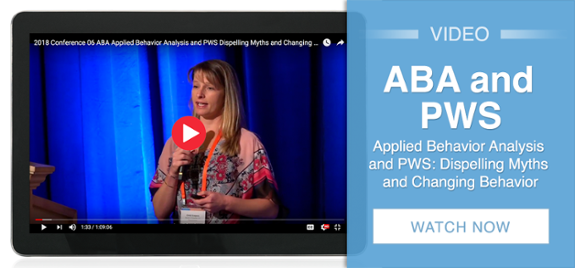In this 75-minute presentation, experts Elizabeth Roof, Anastasia Dimitropoulos, Louise Gallagher, and Lauren Schwartz-Roth discuss what we've learned about social skills and Prader-Willi syndrome. In particular, they discuss what we can do to address social skills and cognition challenges in PWS. The session includes Q&A from participants in the 2020 FPWR Virtual Conference.
Click below to watch the video. If you're short on time, scroll down for timestamps to find the portions you're most interested in.
Presentation Summary With Timestamps
1:56 Opening poll with live audience
- Age of their PWS loved one
- Does the person with PWS have a dual diagnosis of autism diagnosis disorder?
3:50 Susan Hedstrom introduces moderator Lauren Schwartz-Roth, behavior and mental health specialist and clinical psychologist at the FPWR research team
Lauren Schwartz-Roth introduces panel
- The first item in the agenda is the social skills challenges summary, plus the latest research findings by the panelists.
- Second item is the questions directed to the panelist members. She introduces the panel members: Anastasia Dimitropulous, Ph.D., director of the Schubert Center for Child Studies at Case Western Reserve University; Louise Gallagher, Ph.D., M.D. and professor of Child & Adolescent Psychiatry at the Institute of Neurosciences at Trinity College; and Elizabeth Roof, M.A., Senior researcher and Research Lab Director at Vanderbilt University..
7:00 Social Challenges in PWS
- People with PWS tend to be very social: most individuals with PWS really want to make and maintain friendships.
- However, people with PWS can struggle with reciprocal communication, recognizing emotions in others, processing facial expressions, interpreting social cues and learning through watching others, and being aware of other people’s personal space, or ‘space bubbles’.
- They also have difficulties understanding the “Theory of Mind” or the concept that other people might have different desires, intentions and perspectives from their own.
10:55 Anastasia Dimitropulous presents the PRETEND program
- Researcher background: Focuses on studying characteristics of individuals with PWS, including hyperphagia, compulsive behavior and social communication issues.
- Recent research evaluates a play-based remote intervention, or PRETEND program, with young children with Prader-Willi syndrome.
- PRETEND stands for Play-based Remote Enrichment To Enhance Development and is an 8-week intervention program for preschool or school-aged children with PWS to boost play skills and work on challenging behaviors.
- Play has an important predictive value on important areas of development such as adaptive functioning and emotion regulation.
- Play-based interventions in autistic and other atypical populations have been shown to improve outcomes and decrease problem behaviors.
- The research has shown that it can be done remotely with school-age children, and that parents can be their effective play partners.
13:50 Updates and recent findings on the PRETEND program:
- From the Preschool sample, the kids with maternal uniparental were able to significantly improve their quality of play after parent training in comparison versus the population in the same age range with the deletion mutation.
- The child’s affect frequency during play changes by subgroup, with more significant improvements in the UPD one.
- In symbolic (as-if) play, the trend is very similar, and as there was more symbolic play, there was less functional play.
- Moving forward, Dr. Dimitropulous wants to identify why subgroups are responding differently to intervention, including factors such as parent stress, and if play intervention can generalize to social cognitive gains in everyday life.
- Remote participation in school-age (6-9 years old) play intervention is encouraged.
20:30 Dr. Louise Gallagher presents social cognition on ASD symptoms and behavior in PWS
- Researcher background: Located in Dublin, focuses on rare neurodevelopmental syndromes and mental health.
- Research grant recently funded by FPWR focused on influences of social cognition and reward on behavior in PWS.
- Previous research findings: the most common behaviors of concern in children were repetitive questioning, difficulty transitioning and non-compliance (behaviors also present in Autism spectrum disorder or ASD); and in adults there were also hyperphagia-related behaviors.
- There is an overlap at the genetic and behavioral levels between PWS and ASD.
- The research team uses eye-tracking technology and EEG in order to bring clarity to the nature of social cognition and autism traits in PWS to hyperphagia as a social behavior, and if autism’s social behavioral interventions have utility in PWS.
- Another one of the goals of this research is to identify phenotype measures that could have relevance as clinical biomarkers for drug therapies.
28:30 Live poll: experience in structured social skills groups
Elizabeth Roof presents:
- Researcher background: At Vanderbilt University, specializes in psychiatric and behavioral development and has worked with over three hundred families who have a member with Prader-Willi syndrome
- Has worked on several different research studies including most recently the PWS social skills or Building Our Social Skills (BOSS) research program.
- Studying PWS for 25 years, with more than 320 people with PWS through adulthood, focusing on strengths/weaknesses as well as social/behavioral/emotional characteristics of PWS, which have a larger impact on their quality of life.
- Focus on developmentally appropriate behavior, and on development of their independence and interests.
- Many kids with PWS are socially motivated: they want to connect with others and want friends and relationships, but they also need concrete accountability, rules and support across all social settings, including virtual environments.
- People with PWS have difficulty recognizing all emotions except for anger, which can be very memorable for them, even years after the event.
- The BOSS group was created with a group of 60 people with PWS. Participants found they could increase their social skills, increase their sense of connection and some of them even continued to meet virtually after the program ended.
- If behavioral and psychiatric features can be lessened, ability to improve social skills can be improved so much more than if they’re ignored.
44:00 Q&A








